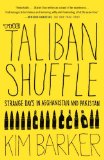Summary | Excerpt | Reviews | Beyond the Book | Readalikes | Genres & Themes | Author Bio

Strange Days in Afghanistan and Pakistan
by Kim BarkerChapter 1
Welcome to the Terrordome
I had always wanted to meet a warlord. So we parked our van on the side of the beige road and walked up to the beige house, past dozens of skinny young soldiers brandishing Kalashnikov assault rifles and wearing mismatched khaki outfits and rope belts hiked high on their waists. Several flaunted kohl eyeliner and tucked yellow flowers behind their ears. Others decorated their rifle butts with stickers of flowers and Indian movie starlets. Male ethnic Pashtuns loved flowers and black eyeliner and anything fluorescent or sparkly, maybe to make up for the beige terrain that stretched forever in Afghanistan, maybe to look pretty.
Outside the front door, my translator Farouq and I took off our shoes before walking inside and sitting cross-legged on the red cushions that lined the walls. The decorations spanned that narrow range between unicorn-loving prepubescent girl and utilitarian disco. Bright, glittery plastic flowers poked out of holes in the white walls. The curtains were riots of color.
We waited. I was slightly nervous about our reception. Once, warlord Pacha Khan Zadran had been a U.S. ally, one of the many Afghan warlords the Americans used to help drive out the Taliban regime for sheltering Osama bin Laden and his minions after the attacks of September 11, 2001. But like a spoiled child, Pacha Khan had rebelled against his benefactors, apparently because no one was paying enough attention to him. First he turned against the fledg-ling Afghan government, then against his American allies. In an epic battle over a mountain pass, the Americans had just killed the warlord's son. The Pashtun code required revenge, among other things, and now, six days after the battle, here I was, a fairly convenient American, waiting like a present on a pillow in Pacha Khan's house, hoping to find a story edgy enough to make it into my newspaper—not easy considering it was March 2003, and there were other things going on in the world. But Farouq told me not to worry. He had a plan.
Pacha Khan soon marched into the room. He certainly looked the warlord part, wearing a tan salwar kameez, the region's ubiquitous traditional long shirt and baggy pants that resembled pajamas, along with a brown vest, a bandolier of bullets, and a gray-and-black turban. The wrinkles on his face appeared to have been carved out with an ice pick. He resembled a chubby Saddam Hussein. We hopped up to greet him. He motioned us to sit down, welcomed us, and then offered us lunch, an orange oil slick of potatoes and meat that was mostly gristle. I had no choice, given how strictly Afghans and especially Pashtuns viewed hospitality. I dug in, using my hands and a piece of bread as utensils.
But just because Pacha Khan fed us, didn't mean he would agree to an interview. The Pashtun code required him to show us hospitality. It didn't force him to talk to me. Pacha Khan squinted at my getup—a long brown Afghan dress over black pants, an Indian paisley headscarf, and cat-eye glasses. I kept shifting my position—with a bad left knee, a bad right ankle, and a bad back, sitting on the floor was about as comfortable as therapy.
Farouq tried to sell my case in the Pashto language. The warlord had certain questions.
"Where is she from?" Pacha Khan asked, suspiciously.
"Turkey," Farouq responded.
"Is she Muslim?"
"Yes."
"Have her pray for me."
I smiled dumbly, oblivious to the conversation and Farouq's lies.
"She can't," Farouq said, slightly revising his story. "She is a Turkish American. She only knows the prayers in English, not Arabic."
"Hmmm," Pacha Khan grunted, glaring at me. "She is a very bad Muslim."
Excerpted from The Taliban Shuffle by Kim Barker. Copyright © 2011 by Kim Barker. Excerpted by permission of Doubleday, a division of Random House, Inc. All rights reserved. No part of this excerpt may be reproduced or reprinted without permission in writing from the publisher.




It is among the commonplaces of education that we often first cut off the living root and then try to replace its ...
Click Here to find out who said this, as well as discovering other famous literary quotes!
Your guide toexceptional books
BookBrowse seeks out and recommends the best in contemporary fiction and nonfiction—books that not only engage and entertain but also deepen our understanding of ourselves and the world around us.